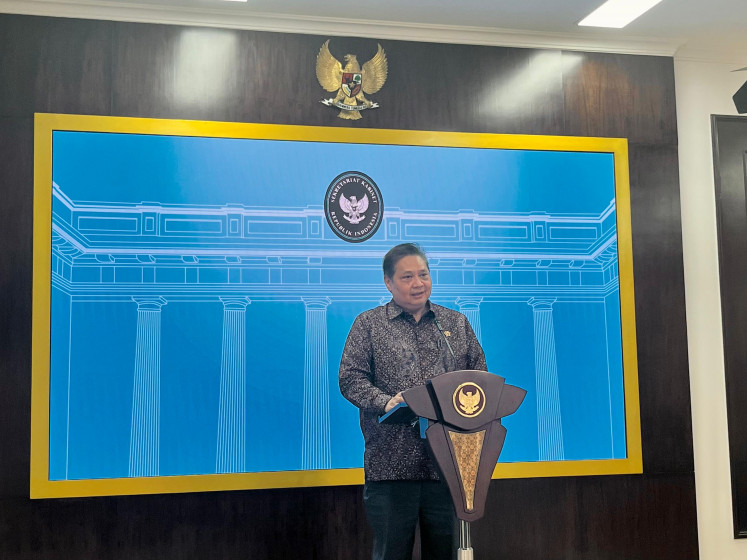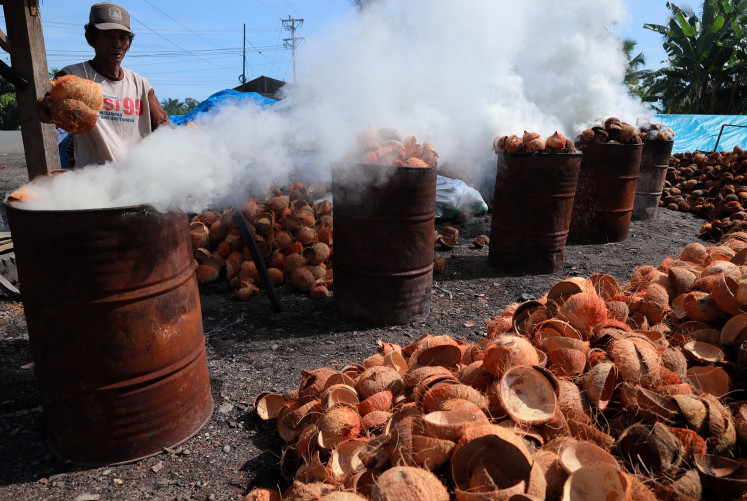Widodo: Blindness no bar to gamelan guru
JP/Slamet SusantoAlthough Widodo has been blind since birth, that hasn’t prevented him from mastering gamelan
Change text size
Gift Premium Articles
to Anyone

JP/Slamet Susanto
Although Widodo has been blind since birth, that hasn’t prevented him from mastering gamelan. Nor has he been put off by jeers from some in his kampung.
Although he is unable to see what he is playing, the father of two relies on his other senses: touch, hearing, memory and emotions.
“I’ve been blind since birth, but the justice of God is that my other senses such as hearing and my memory are naturally better,” Widodo said.
When The Jakarta Post visited his house near the Thousand Hills area in Jati village, Sriharjo, Imogiri, Bantul (25 kilometres South of Yogyakarta city), Widodo said he had enjoyed the sounds of gamelan – the Indonesian orchestra composed mainly of tuned percussion instruments such as bamboo xylophones – since childhood.
The sounds of gamelan, he said, could be felt in the heart and created a peaceful feeling. This sense of peace made Widodo feel normal and not inferior to others, despite his impaired sight.
“I’m blind, so what job could I do? If I don’t have skills, there is no meaning to life. So because I liked gamelan, since childhood I have been determined to master it,” he recalled.
When Widodo was young, one day a ledek group passed in front of his house. Ledek is a dance accompanied by the sound of drums and gamelan instruments.
“I immediately asked my father to buy the musical instruments that were used to perform ledek in the form of a drum and a saron [a horizontal set of bronze bars].”
Widodo was lucky because his father, the late Karto Pawiro, known as Ponijo, was the head of a company wholesaling agricultural products
in his village. Whenever Widodo wanted a musical instrument, his father was always able to buy it for him.
While he was learning the gamelan, a football field, 25 metres from his home, became the site of ketoprak tobong performances for more than two months. Ketoprak tobong is a Javanese folk dance drama, which constantly moves from one city to another.
At midday, when the ketoprak tobong wasn’t performing, the young Widodo went backstage where a set of gamelan instruments had been laid out. “Instead of being scolded by the wiyogo [the gamelan drummer], he began to teach me. From then on I was serious about learning the gamelan,” he said.
Widodo’s artistic talent was obvious and he could soon play all the musical instruments that his parents had bought. To improve his gamelan-playing abilities, Widodo was sent to a special school in Yogyakarta in 1973.
Between 1973 and 1977, Widodo continued to study gamelan in Surakarta, Central Java. He learned other skills, such as reflexology.
In 1977, the then 19-year-old was asked to return home to marry Sawiyem, a woman his parents chose for him.
The couple had three children: Sri Rejeki, Sri Wahyuni and Juwarni.
Widodo also joined Ki Cermo Sutarno, a famous dalang (the narrator and puppet master in the traditional shadow puppet plays) at that time. The dalang’s expertise in playing various gamelan instruments ensured that Widodo became the wiyogo (gamelan drummer).
“I became a popular wiyogo because I could play the various musical instruments. If the small drummer was sick, I played the small drum; if the gong player was absent, I could be his substitute. I could play the entire range of gamelan instruments,” Widodo said.
While other wiyogo used textbooks or notes for guidance, Widodo relied on his feelings.
“The key to playing the gamelan is in the heart and feeling. If we play with all our heart, the harmonization will be created naturally,” he said.
As the principal wiyogo, Widodo figured in every performance. Even in the month of August or Suro (the first day in the Javanese new year), Widodo took time to come home once a week for the family.
“I performed around Central Java starting from Pati and going to Temenggung, Semarang, Banyumas and various other cities,” he recalled.
Dalang Sutarno died in 1995. However Widodo continued to be active in the gamelan world. He was always being invited to perform on stage as a dalang in several regions.
In addition to playing the gamelan, Widodo frequently partook in additional duties, such as tuning or adjusting the gamelan instruments.
Widodo was able to support his family working as a wiyogo.
However, the rise of new forms of entertainment, especially television, marginalized traditional arts that need gamelan rythms, such as puppetry and ketoprak. Widodo rarely performs these days.
To increase his income, up until the earthquake of 27 May 2006, Widodo made bricks.
Widodo and his wife also made tempeh. Every day they used 10 kilograms of soybeans. Widodo made rope from banana stems and his wife sold these on the market. Every day, they were able to earn Rp 40,000 (US$4) from these activities.
At night, Widodo, who had also mastered the skill of reflexology, sometimes provided a massage service.
But despite his busy schedule, Widodo has not forgotten the gamelan.
At the moment he supervises two groups that routinely practice every Wednesday and Sunday on kliwon (the Javanese five-day week).
Gamelan is part of Widodo’s identity and a special characteristic of community culture. Although currently unable to compete with pop music or reggae that young people enjoy, Widodo believes people will continue to be interested in gamelan.
“Gamelan directly touches the heart and will remain, whatever happens.”









